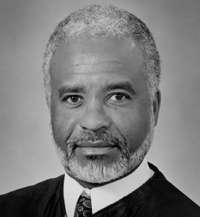Henry H. Kennedy Jr.
| Henry Harold Kennedy Jr. | |
|---|---|
 | |
| Judge of the United States District Court for the District of Columbia | |
|
In office September 18, 1997 – November 18, 2011 | |
| Appointed by | Bill Clinton |
| Preceded by | Joyce Hens Green |
| Succeeded by | Ketanji Brown Jackson |
| Associate Judge of the Superior Court of the District of Columbia | |
|
In office 1979–1997 | |
| Appointed by | Jimmy Carter |
| Magistrate Judge of the United States District Court for the District of Columbia | |
|
In office 1976–1979 | |
| Personal details | |
| Born |
February 22, 1948 Columbia, South Carolina, U.S. |
| Alma mater |
Princeton University A.B.. Harvard Law School J.D. |
Henry Harold Kennedy Jr. (born February 22, 1948) is a former United States District Judge for the United States District Court for the District of Columbia.
Biography
Born in Columbia, South Carolina, Kennedy received an A.B. from Princeton University in 1970 and a J.D. from Harvard Law School in 1973. Following graduation, he worked for the law firm of Reavis, Pogue, Neal and Rose in Washington, D.C.. Subsequent to this he was an Assistant United States Attorney for the District of Columbia between 1973 and 1976.
He served as a United States Magistrate for the United States District Court for the District of Columbia between 1976 and 1979. He was appointed Associate Judge of the Superior Court of the District of Columbia in December 1979 where he served until he was appointed as a federal judge in September 1997.
On May 15, 1997, Kennedy was nominated by President Clinton to a seat on the United States District Court for the District of Columbia vacated by Joyce Hens Green. Kennedy was confirmed by the United States Senate on September 4, 1997, and received his commission on September 18, 1997. He retired on November 18, 2011.[1]
He has two daughters, Morgan and Alexandra, who both attended Princeton University. Kennedy's brother Randall is a professor at Harvard Law School.
Notable cases
- In November 2007, Kennedy ordered the Bush White House to preserve its emails.[2]
- On January 9, 2008, Kennedy rejected a request from terror suspects held at Guantanamo Bay seeking a court hearing into the destruction of interrogation tapes by the CIA in 2005.[3]
- On August 16, 2010, Kennedy ruled that Guantanamo Bay detainee Adnan Farhan Abd Al Latif could not be held by the U.S. government. Kennedy found that the government's key piece of evidence, a heavily redacted intelligence report, was not sufficiently reliable to justify Latif's detention. The D.C. Circuit later reversed this ruling, holding that Kennedy should have accorded a presumption of regularity to the report. Commentators have criticized the D.C. Circuit's reversal of Kennedy's reliability holding.[4][5]
- On June 24, 2011, Kennedy issued a ruling addressing the role of the U.S. Constitution's Speech or Debate Clause in federal legislative branch employment lawsuits. He held that the Speech or Debate Clause barred discrimination and retaliation claims that could not be proven without inquiry into internal legislative branch communications, but held that such claims could go forward if the supposedly protected legislative explanation for the challenged employment action could be shown to be pretextual without inquiry into protected legislative activity.[6]
References
- ↑ "Two D.C. Federal Judges to Retire", The BLT, November 10, 2011.
- ↑ "White House Directed To Preserve E-Mails", CBS News, February 11, 2009.
- ↑ "Judge nixes hearing on destroyed CIA tapes", January 10, 2008.
- ↑ Benjamin Wittes, "Thoughts on Latif #4–A Fuller Analysis", Lawfare, November 12, 2011.
- ↑ http://www.harvardlawreview.org/media/pdf/vol125_latif_v_obama.pdf
- ↑ "Protections for Legislative Branch Employees", Passman & Kaplan.
External links
- Henry H. Kennedy Jr. at the Biographical Directory of Federal Judges, a public domain publication of the Federal Judicial Center.

| Legal offices | ||
|---|---|---|
| Preceded by Joyce Hens Green |
Judge of the United States District Court for the District of Columbia 1997–2011 |
Succeeded by Ketanji Brown Jackson |